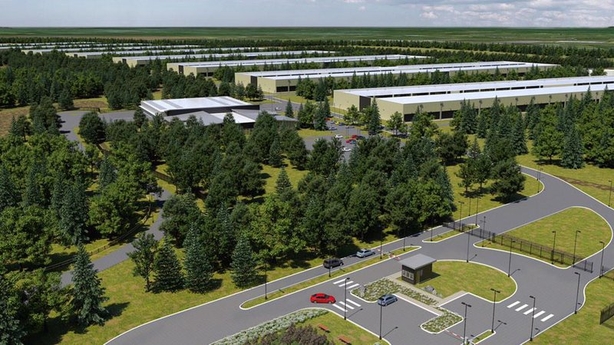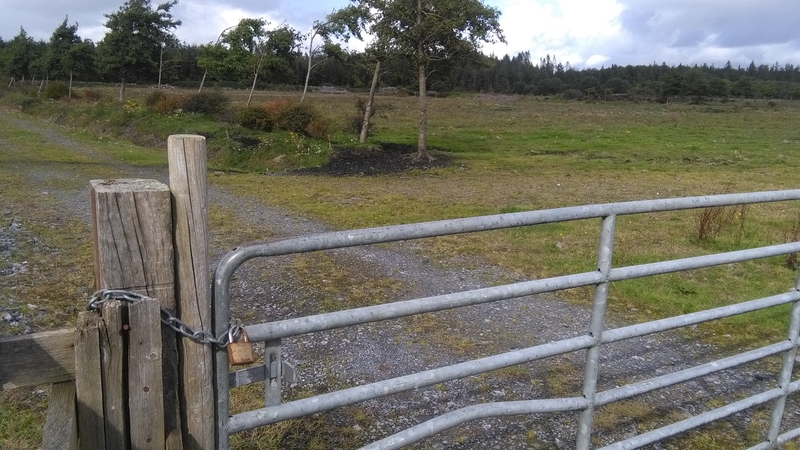Apple has announced that it is not going to proceed with its planned data centre in Athenry, Co Galway.
In a statement, the company said despite its best efforts, delays in the planning approval process had forced it to make other plans.
The firm added that while disappointing, the setback would not dampen its enthusiasm for future projects in Ireland as its business grows.
The decision, while not entirely unexpected, will come as a bitter blow to supporters of the project in the Galway town and the wider economy.
The project has been bogged down in planning delays since it was first announced more than three years ago.
Apple has scrapped plans to build in Athenry over planning delays. People in the town are angry | https://t.co/5rfRLSOdCb pic.twitter.com/BngXVBfUwq
— RTÉ News (@rtenews) May 10, 2018
Details of the decision were communicated in a letter to lawyers for objectors to the scheme ahead of a Supreme Court hearing on the matter.
At the court this morning, counsel for Apple told Chief Justice Frank Clarke that the company will not now proceed with the Athenry project and are withdrawing from the proceedings.
"We’ve been operating in Ireland since 1980 and we're proud of the many contributions we make to the economy and job creation," Apple said in a statement this morning.
"In the last two years we've spent over €550 million with local companies and, all told, our investment and innovation supports more than 25,000 jobs up and down the country.
"We're deeply committed to our employees and customers in Ireland and are expanding our operations in Cork, with a new facility for our talented team there."
However, the appeal taken by two Athenry residents' over aspects of An Bord Pleanála's planning permission for provisions for the data centre has not been withdrawn.
Chief Justice Clarke said the commercial urgency has disappeared but others might still like to use the planning permission, so he adjourned the matter until 31 May.

Read more
Analysis: Writing was on the wall
Timeline: Apple in Athenry
The two locals who brought the case, Sinead Fitzpatrick and Alan Daly, were in the Supreme Court for the hearing.
Afterwards they declined to be interviewed saying they need to consider the impact of Apple's decision.
Meanwhile, Minister for Business, Enterprise and Innovation Heather Humphreys has said the State's planning and legal processes need to be more efficient.
Speaking on RTÉ’s News at One, Ms Humphreys said the Government and IDA had done everything it could to assist the Athenry project, but ultimately delays in the planning process were to blame for Apple's decision to pull out.
"We did everything we could to support this investment but Apple have ultimately taken a commercial decision not to proceed, but they have made it clear the delays the project experienced have caused them to re-consider it," said Ms Humphreys.
"And the delays of course, if nothing else, underline our need to make sure the State's planning and legal processes are more efficient."
She added that the Government has been working to make improvements and has announced a number of legislative proposals that would allow future proposed data centres apply directly to An Bord Pleanála.
Decision taken by Apple is disappointing albeit unsurprising, says IDA
IDA Ireland said that it notes the decision taken by Apple.
In a statement, the CEO of IDA Ireland described the decision as "disappointing albeit unsurprising."
Martin Shanahan said that the delays in achieving a definitive outcome from the planning process led to today’s decision by Apple. He also said that a higher degree of predictability in relation to Ireland’s planning process was needed.
The organiser of the Athenry for Apple campaign said he could not blame Apple for pulling out of the project.
Paul Keane said the delays in the planning and approval process would cost not just Athenry but future investment in rural Ireland.
Apple first announced plans to construct the data centre on a greenfield site at Derrydonnell Woods near Athenry in February 2015.
Construction of the first phase of eight promised to generate 300 temporary jobs, with up to 150 permanent staff required to run it.
The following September, Galway County Council gave permission for it to proceed subject to conditions, but that decision was subsequently appealed to An Bord Pleanála.
Following an oral hearing the planning authority confirmed the permission in August of 2016.
However, a review of that decision was sought by three objectors, locals Mr Daly and Ms Fitzpatrick, and businessman Brian McDonagh in the High Court.
Last October, the High Court cleared the way for the project to proceed and the following month, the court refused to give the objectors permission to appeal its decision to the Court of Appeal.
But in December, Mr Daly and Ms Fitzpatrick then asked the Supreme Court to hear an appeal of the High Court decision and last week it emerged the court had granted their request.
A preliminary case management hearing is scheduled to take place this morning.
Amid the delays, Apple had remained tight-lipped about whether or not it still intended to proceed with the data centre.

At a meeting last year with the Taoiseach in the US, Apple Chief Executive Tim Cook stopped short of committing to begin the project if final permission was to be granted.
At the same time as Apple announced plans for the data centre for Athenry, it also announced one for Viborg in Denmark.
But while the Athenry facility was stalled in planning, work on the first phase of the Danish centre proceeded and it is expected to open next year.
In the meantime, Apple also announced another centre for Aabenraa in Denmark, which is still in the planning phase.
The decision by Apple to scrap plans for Athenry will reignite debate about whether major infrastructural investments by companies here should have a fast-track process.
Last November, the Taoiseach said data centres such as the one for Galway would in future be considered strategic infrastructure for planning purposes.
This means that applicants wishing to develop such centres will apply for permission directly to An Bord Pleanála, and no longer be required to seek initial planning from the local authority.
The designation allows projects to proceed through the planning phase faster.
Additional reporting: Joe Mag Raollaigh






